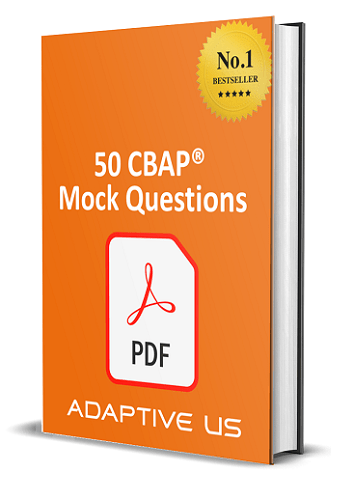
Introduction
Are you looking to advance your business analysis career and stand out among your peers? Then, consider obtaining the coveted CBAP certification. However, passing the exam is no easy feat. It requires rigorous training and preparation. In this blog post, we will reveal the ten commandments of CBAP training that have been proven to work in helping aspiring professionals ace the exam and earn their certification. From joining all sessions to reviewing simulation performance, these tips will help you become a successful CBAP candidate and take your career to new heights!
Commandment #1 - Get prepared
Commandment #1 of CBAP training is to get fully prepared before the start of your course. Preparation is vital and can make all the difference in achieving a successful outcome. To prepare yourself, you must clearly understand CBAP certification objectives, exam format, and essential concepts.
Start by researching online for relevant resources to help you understand the scope of CBAP certification and requirements. Also, gather study materials like textbooks, notes from previous courses, or blogs on related topics.
Create a goal-oriented study plan that breaks down chapters into manageable sections within specific timeframes. This approach will help you stay organized while tracking your progress as you move closer to completing each chapter.
Furthermore, establish a dedicated study space with no distractions such as TV or mobile phones so that maximum attention can be given during studying sessions. Prioritizing this preparation phase ensures that learners are ready to learn actively when their classes begin.
Getting enough sleep and eating healthy food provides an optimal environment for learning retention, which in turn enhances the quality of one's studies. By following these tips under Commandment #1 - Get Prepared, students have set themselves up for success in their CBAP journey!
Commandment #2 - Keep your doubts and questions ready
As you dive into CBAP training, keeping an open mind is essential. You will be learning a lot of new concepts, techniques, and methodologies that might seem overwhelming at first. That's why keeping your doubts and questions ready is essential.
Write it down immediately whenever you come across something that doesn't make sense or confuses you. Don't wait until the end of the session to ask your doubt or question. This way, you'll clearly understand what's being taught in each session.
Remember: there are no stupid questions! If something is unclear to you, chances are other students might feel the same way too. By asking questions during class, everyone benefits from better clarity on a topic.
Keeping track of your doubts and questions is of immense help when reviewing course material later on. Then, after all, sessions have ended, go through everything again with fresh eyes – review notes while engaging in self-study exercises or simulations – by doing so, gain better insights into any areas where confusion persists.
Commandment #3 - Join in all sessions
Commandment #3 of CBAP training is all about attending every session. It may seem obvious, but attending all sessions is crucial to get the most out of your CBAP certification journey.
By attending every session, you'll be able to stay up-to-date with the latest information and insights related to business analysis. So even if you feel confident in a particular area, there's always more to learn and new perspectives to gain.
Moreover, each session builds on the previous ones. If you miss one or two sessions, it can be hard to catch up and understand what has been covered before. Don't let that happen! Attend all sessions consistently to keep track of what's going on.
Also, joining in every session means getting involved and participating actively. Ask questions when needed; share your thoughts with others during discussions; offer suggestions on how topics could have been approached differently - this will help deepen your understanding while making for a better learning experience overall.
In short: make sure you're present for every class without fail because attendance is essential in maximizing the value of your CBAP training program!
Commandment #4 - Clarify your doubts and questions
Commandment #4 of CBAP training is about clarifying your doubts and questions. It's natural to have questions or uncertainties during the course, but don't let them hold you back. Be proactive and seek clarification from your instructor or peers.
One way to clarify your doubts is by asking relevant questions during the sessions. Don't hesitate to raise your hand or type in a chatbox if something isn't clear. Remember that everyone in the class is there to learn, so chances are someone else has the same question as you.
Additionally, take advantage of any communication channels your trainers provide, such as email and messaging platforms like Slack or WhatsApp groups - ask away! The more you understand now will make it easier later down the line when preparing for CBAP certification exams.
If there are still lingering doubts after class hours, consider forming study groups with other students enrolled in the program. Collaborating can help answer each other's concerns while also building teamwork skills needed in business analysis projects
Never feel embarrassed about asking "basic" questions either – sometimes, these become critical points for understanding more complex topics further down the track.
Commandment #5 - Make notes
Making notes is a crucial aspect of CBAP training. It helps you keep track of important information and insights shared during the sessions. When making notes, it's essential to be organized and concise.
Start by identifying the key points discussed in each session and write them down in your notebook or computer. Use bullet points or mind maps to make your notes visually appealing and easy to understand.
In addition to writing down key points, take note of any questions that come up during the session that you may want to ask later. This will help ensure that you don't forget anything important.
Another tip is to use abbreviations or symbols when taking notes, as this can save time and space while conveying meaning effectively.
Remember, good note-taking skills are practical during training and when studying for the CBAP certification exam later on. Therefore, make sure your notes are clear enough for future reference so they can assist with exam preparation.
Making well-organized and detailed notes throughout CBAP training is a must-do commandment if you want success in obtaining your certification!

Commandment #6 - Revise session content
As the CBAP training progresses, revising and consolidating what you have learned in each session is essential. This helps in retaining information better and enhances your understanding of the subject matter.
One way to effectively revise is by referring to the notes taken during the sessions. Reviewing these notes will help you recall important points, insights, and definitions covered during class.
Another helpful method for revision is summarizing each session's key learnings in a separate document or notebook. This reinforces your understanding and provides a quick reference guide when reviewing before exams or interviews.
Besides, revisiting chapter questions discussed in previous sessions can be helpful too. Attempting them again after some time has passed will help identify areas where improvement is necessary while reinforcing the knowledge that has already been acquired.
Commandment #6 emphasizes the importance of revising session content regularly throughout CBAP training. It enables effective learning retention and ensures you are well-versed with all concepts covered so far.
Commandment #7 - Practice chapter questions
One of the most important commandments to follow during CBAP training is to practice chapter questions. These questions are specifically designed to test your understanding of the course material and help you identify any areas where you may need further clarification.
By practicing chapter questions, you can strengthen your knowledge and improve your chances of passing the CBAP certification exam. It's essential that you take the time to carefully review each question and consider all possible answers before making a selection.
If you're struggling with certain topics or concepts, don't hesitate to go back and revisit those sections in your course materials. This will give you a better understanding of what's being asked in the chapter questions and help build confidence for tackling similar problems on the exam.
Remember, practice makes perfect! The more time you spend practicing chapter questions, the more comfortable and confident you'll feel when faced with similar scenarios on test day. So be sure to prioritize this commandment during your CBAP training journey!
Commandment #8 - Join office hours
Office hours are an excellent opportunity to have one-on-one interaction with the CBAP trainer. Therefore, it's always advisable to join them as they can help you clear all your doubts and queries. During these sessions, trainers will discuss various topics covered in previous classes, allowing learners to ask more specific questions.
Joining office hours is also beneficial for those who may have missed some of the previous sessions or chapters due to any reason. The trainer can go over the content again during these sessions and provide additional explanations if required.
Moreover, office hours are also a chance for learners to connect with other participants in the training program who might be facing similar issues or challenges while preparing for CBAP certification. This way, learners can share their experiences and knowledge, which helps everyone grow together.
Joining office hours is highly recommended for anyone pursuing CBAP certification as it provides personalized attention from the trainers along with opportunities for networking and collaborative learning.
Commandment #9 - Practice all simulations
Practicing all the simulations is vital for success in the CBAP certification exam. Simulations are a great way to understand how to apply your knowledge in real-world scenarios. The exam consists of multiple-choice and case study-based questions that require you to analyze information, identify problems, and provide solutions. In addition, practicing with simulations will help you familiarize yourself with the exam format.
It's essential to practice as many simulations as possible before taking the test, so you can prepare yourself for any type of question that may come up. During practice sessions, focus on time management skills and accuracy and try to improve your speed in answering questions.
If, at any point during your simulation practice sessions, you feel stuck or unsure about an answer, take a step back and re-read the question carefully before making assumptions or guesses because sometimes they might be tricky.
Make sure that you review each simulation after completing it. Analyze where you went wrong and what steps could have been taken differently if given another chance; this helps increase your learning curve over time.
Finally, become proficient by regularly practicing until there no longer seems like anything new left to learn from them!
Commandment #10 - Review all simulations performance
Commandment #10 of CBAP training is to review all simulation performances. This means that after completing each simulation, you should take the time to analyze your performance and identify areas where you can improve.
One way to do this is by reviewing the questions you got wrong and understanding why you chose the incorrect answer. This will help you avoid making similar mistakes in future simulations or even real-life scenarios.
Another helpful strategy is to compare your results with those of other learners who have taken the same simulation. You can use this information as a benchmark for improvement and aim for better performance each time.
It's important not to get discouraged if your initial results are not as good as expected. Remember, practice makes perfect, so keep improving your skills through consistent efforts.
Additionally, it's essential to pay attention to feedback from instructors or mentors and incorporate their suggestions into your learning process. They may provide valuable insights on how to approach certain situations or concepts more effectively.
Reviewing all simulations' performances is an integral part of CBAP training that ensures continuous improvement toward achieving certification success. By analyzing our mistakes, comparing our results with others, and seeking feedback from instructors or mentors, we can gain valuable knowledge and hone our skills effectively.
Conclusion
Following these commandments of CBAP training will help you pass the certification exam with flying colors. Remember to prepare well and keep your doubts ready for clarification during sessions. Join all sessions, make notes, and revise session content regularly.
Practicing chapter questions, joining office hours, practicing simulations, and reviewing simulation performance can significantly improve your chances of passing the CBAP certification exam on the first attempt.
At the end of each day's study session, take a moment to reflect on what you learned and how it applies to real-world scenarios. This reflection will help reinforce your newly acquired knowledge as you progress toward earning your CBAP certification.
Remember that earning a CBAP certification is not just about memorizing information but applying it in practical situations. Focus on understanding concepts rather than rote learning them. Dedication and hard work can make anyone a certified business analysis professional!
Ten Lesser-Known Benefits of CBAP Training
Ten Key Advantages of Joining the Best CBAP Training
Top 10 CBAP Exam Prep Tips from our 600+ past CBAPs
You May Also Like
These Related Stories

Here's What Really Matters in Your CBAP Training

Ten Lesser-Known Benefits of CBAP Training


Comments (16)